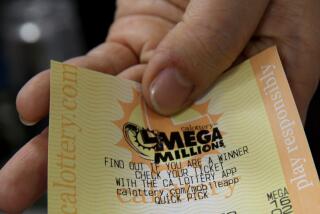Tempus Fugit : Gas Station Attendant’s $139,585 Lotto Ticket a Loser Because It Was a Day Late, Judge Rules
- Share via
SANTA ANA — Saying that a potential lottery winner “did not follow the rules and regulations,” an Orange County Superior Court judge ruled Tuesday that the California State Lottery would not have to honor a Quick Pick Lotto ticket that would have paid $139,585 but was turned in a day late.
Paul Manarang, the 43-year-old Laguna Hills gas station attendant who purchased the ticket, sat expressionless in the court’s spectator section as the judge’s decision was announced.
“I feel so sad,” Manarang said after the ruling. He said he had hoped to use his winnings to bring an ill sister from the Philippines to the United States for medical treatment, and that since the controversy he had experienced health problems of his own.
Now, he said, “I don’t play (the lottery) anymore because I don’t have any money to play with now. I just work as a gasoline attendant in a gas station.”
Manarang bought the ticket on a visit to San Francisco June 23, 1990. It carried five of six picks and the bonus number. But Manarang said he didn’t realize the ticket was a winner until months later, when he found it inside the glove compartment of a vehicle he was trying to sell.
Manarang had the ticket validated at a Dana Point Lotto outlet on Dec. 18, 1990, nearly six months after it was issued. The Filipino immigrant, concerned about his immigration status at the time, asked his nephew, Jason Quiwa Shauf, who is a citizen, to claim the winnings. Manarang said he is now a legal temporary resident of the United States.
But Shauf did not file an official claim for the prize until three days later--one day after the lottery’s 180-day limit for such claims expired.
When lottery officials denied the claim, he sued for the amount of the prize, plus $1 million for alleged emotional distress.
Superior Court Judge Thomas N. Thrasher tried the case without a jury, based on written briefs and oral arguments.
The defense argued that Manarang’s delay was excusable because it fell under a provision of lottery rules concerning tickets that are stolen or fraudulently taken.
But Thrasher did not accept that logic. In order for the lottery to operate, the judge said, the laws “must be strictly construed” and “binding on those who play the game.” To act otherwise, Thrasher said, would “open a Pandora’s box.”
“I thought the judge’s decision was very well reasoned and well-grounded,” said Linda J. Vogel, deputy attorney general.
“The Lotto games and the other games run by the California State Lottery involve millions of transactions . . . and every player agrees to abide by those rules when they play the game,” she said.
Vogel acknowledged that there was some concern on the part of illegal immigrants about collecting their winnings, but she said that concern was unfounded. As for Manarang, Vogel said, “we wish he plays and we wish he wins.”
Manarang’s attorney, Rick L. Eby, said he was “definitely disappointed in the verdict,” adding that he would take a few days to decide whether there are grounds for appeal.
“If I didn’t believe in this case I would have never taken the case on,” Eby said.
Eby characterized the lawsuit as a David versus Goliath struggle, “where an attorney and his client (are) taking on the state of California, knowing the difficulties that we would face throughout the course of the litigation process.
“I still felt confident that justice would be served and my client would in fact receive his winnings. As it turned out, it didn’t work out that way,” he added.
Now working as a night cashier, Manarang said he didn’t understand the judge’s reasoning, but that he was not angry.
“I told my friends that whenever they bought a ticket, be sure they have to check it because the lottery has strict regulations about the games,” he said. “That’s it.”
More to Read
Sign up for Essential California
The most important California stories and recommendations in your inbox every morning.
You may occasionally receive promotional content from the Los Angeles Times.










